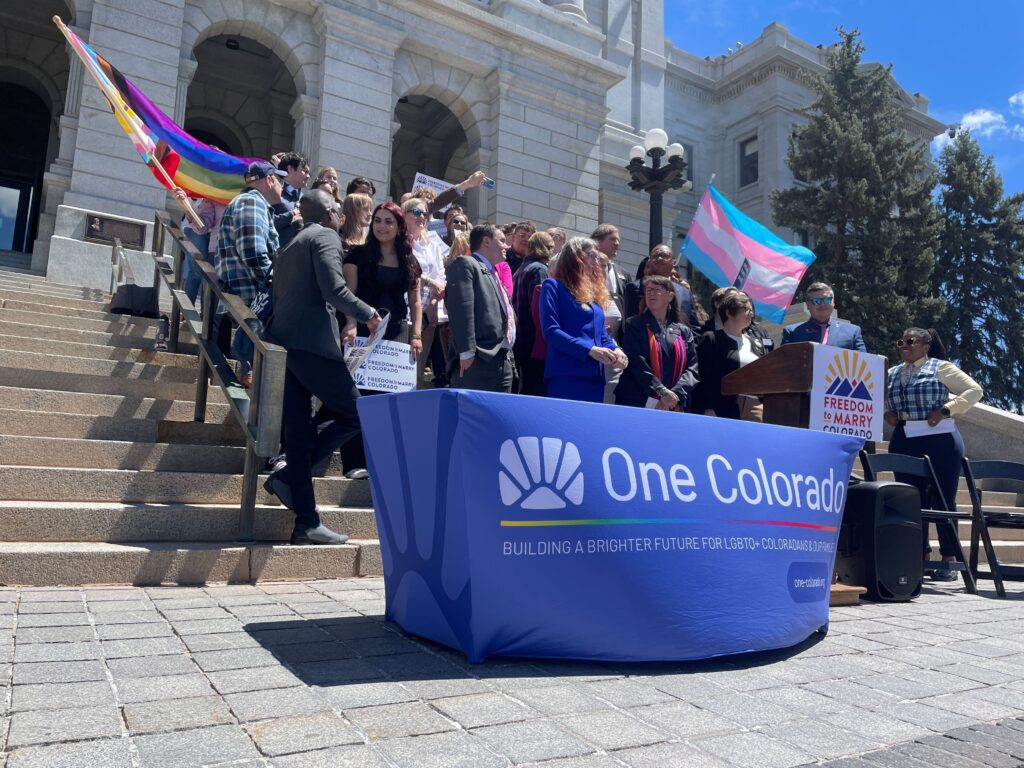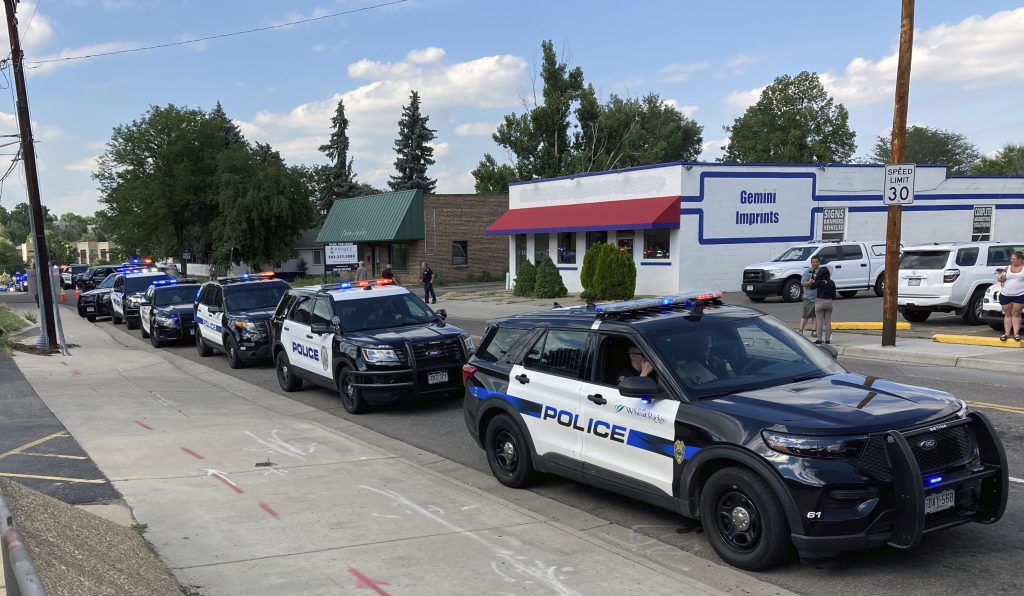
Updated Oct. 13, 2024
Colorado’s biannual exercise in direct democracy will get a real workout this year, with voters asked to weigh in on more than a dozen changes to the state’s laws and constitution. Half of those questions were put on the ballot by state lawmakers and the rest come from interest groups outside the Capitol.
CPR News will publish a thorough guide in time for you to fill out your ballot, but in case you want a sneak peek, here’s a complete list of the statewide questions (you can read the text of each measure by clicking on its title):
Amendment G: Allow more disabled veterans to access a state property tax exemption
The constitutional amendment would expand the number of veterans living with a disability who qualify for a property tax exemption for a portion of the value of their primary residence. Currently, what’s known as the homestead exemption is limited to veterans with a service-related disability rated as 100 percent permanent.
If voters agree, eligibility would expand to include veterans with a significant service-connected disability that makes them unable to work, what the Veterans Administration classifies as having ‘individual unemployability’ status. Non-partisan legislative staff estimate that change would cover around 3,400 more veteran homeowners.
The constitutional amendment cleared the state legislature unanimously.
CPR voter guide entry for Amendment G
Amendment H: Setting up a judicial discipline board
Lawmakers want to change the rules for how Colorado handles misconduct within the judicial branch. This amendment would set up a new independent judicial discipline board, made up of judges, attorneys and members of the public. The board would conduct disciplinary hearings and hear appeals of informal remedial sanctions handed down by the Commission on Judicial Discipline.
This proposal follows extensive reporting by David Migoya of the Colorado Springs Gazette into a string of scandals in the judicial branch. Those revelations led lawmakers to push for a new way to handle judges accused of wrongdoing independent of the state Supreme Court.
The referred constitutional measure cleared the legislature with only one no vote.
CPR voter guide entry for Amendment H
Amendment I: No bail for defendants in first degree murder cases
This constitutional amendment would make first degree murder suspects ineligible for bail, as long as prosecutors can show they have a strong enough case.
The desire for lawmakers in both parties to make this change stems from an unintended consequence of Colorado’s repeal of the death penalty in 2020. The state constitution says only people charged with “capital offenses” can be denied bail, and last year the Colorado Supreme Court ruled that without execution as a potential punishment, first degree murder no longer meets that criteria.
Colorado lawmakers referred the proposal to the ballot by a wide margin; only four Democrats and one Republican voted against it. It will need 55 percent of the vote on Election Day to pass.
CPR voter guide entry for Amendment I
Amendment J: Remove the same-sex marriage ban from the state constitution

Colorado’s constitution still contains obsolete language that defines marriage as exclusively between a man and a woman. Even though the U.S. Supreme Court legalized same-sex marriage across the United States nine years ago, some advocates worry conservative justices could reconsider that precedent.
The initiative would strike a portion of the state constitution that reads: “Only a union of one man and one woman shall be valid or recognized as a marriage in this state.” The referred measure cleared the legislature with only one Democratic no vote, and eight Republicans joining the rest of the Democrats to back it. Because the measure takes something out of the constitution, instead of adding something in, it only needs a simple majority of voter support.
Under Colorado law, it requires a simple majority of voters to repeal a provision of the state constitution.
CPR voter guide entry for Amendment J
Amendment K: Earlier deadlines to set the ballot
This constitutional amendment would move up by one week the deadlines for citizen initiatives to file their petition signatures. The same change would also apply to the Declaration of Intent judges and justices must file if they seek to run for retention. The proposal would also require nonpartisan research staff to publish the official text and titles of ballot measures a month earlier. The changes would give the Secretary of State and county clerks a bit more room to finalize the content of ballots before they have to be printed and sent to voters.
Because it is a constitutional amendment, this measure will take 55 percent of the vote to pass.
CPR voter guide entry for Amendment K
Amendment 79: Enshrine legal abortion in the state constitution
In 2022, as it began looking likely that the U.S. Supreme Court would overturn Roe v. Wade, Colorado’s Democratic lawmakers passed a measure explicitly protecting access to legal abortion in state law.
This year abortion rights activists want to take the policy a step further and write it into Colorado’s Constitution. The proposed amendment also lifts a ban on public funding for abortion that voters approved 40 years ago. That could allow for Colorado to cover more abortions under Medicaid and for the state and local governments to add abortion coverage to their employee health insurance plans.
Because it is a constitutional amendment, this measure will take 55 percent of the vote to pass.
CPR voter guide entry for Amendment 79
Amendment 80: Constitutional right to school choice

This one-paragraph amendment would enshrine in the state constitution the right of parents to choose the type of education to give their children, from kindergarten to 12th grade, including neighborhood, charter and private schools, homeschooling, open enrollment option and “future innovations in education.”
Because it is a constitutional amendment, this measure will take 55 percent of the vote to pass.
CPR voter guide entry for Amendment 80
Proposition 127: Ban the sport hunting of big cats

A mountain lion in a snow storm in Teller County.
This initiative would end the hunting seasons for mountain lions and bobcats in Colorado, and bar the state from ever allowing lynx hunting (lynx, which were reintroduced in Colorado in 1999, are still considered endangered by the state).
Big cats could still be killed by state or federal employees as a part of population management efforts or, with state permission, by ranchers to prevent livestock depredation. People who accidentally hit an animal with their car would not be penalized.
CPR voter guide entry for Prop. 127
Proposition 128: Parole eligibility for people convicted of violent crimes
Under Prop 128, people convicted of certain offenses would have to serve at least 85 percent of their sentence before becoming eligible for parole or early release for good behavior. That’s an increase from current law, which allows inmates to apply for discretionary parole after they’ve served at least three-quarters of their sentence, or even sooner if they’ve earned time off through their behavior while incarcerated.
The list of covered crimes includes murder, sexual assault, aggravated robbery, and serious cases of assault, kidnapping, arson and burglary.
The initiative would also require anyone convicted of any of the listed offenses three or more times to serve their complete sentence, without any chance of early release.
CPR voter guide entry for Prop. 128
Proposition 129: Creating the position of Veterinary Professional Associate
The measure would create a new mid-level position — between a vet technician who has a two-year associate’s degree and a veterinarian who has eight or more years of education — called a veterinary professional associate, or VPA. VPA’s would be people with Master’s degrees in veterinary care who could diagnose animals, perform routine surgeries, and order and perform tests and procedures under the supervision of a licensed veterinarian.
The idea is backed by animal welfare groups concerned about a shortage of affordable veterinary care, and opposed by veterinary professionals who warn the training requirements are insufficient for the level of care VPA’s will be allowed to offer.
CPR voter guide entry for Prop. 129
Proposition 130: $350 million in state funding for law enforcement

This measure requires the state government to set aside $350 million in a dedicated fund for law enforcement. The money would go to two things:
- Paying a new, million dollar death benefit to the survivors of law enforcement officers killed in the line of duty.
- Funding grants to local police and sheriffs’ departments to boost hiring and retention. The grants could be used to increase pay or expand training opportunities, among other things.
The initiative does not require the state to set aside the entire $350 million in a single year, but it does require the money to come from Colorado’s existing budget, not new taxes.
CPR voter guide entry for Prop. 130
Proposition 131: All candidate primaries and ranked-choice voting
The way Colorado conducts its state and federal elections would change in two significant ways under this initiative:
- No more party primaries: Instead of having each party pick its own candidate for the general election, all qualified contenders in a given race would be placed on the same primary ballot. The top four vote-getters, regardless of party affiliation, would move on to the general election.
- Ranked-choice voting for general elections: Ahead of the November election, voters would get a ballot listing the four candidates. Instead of selecting just one, voters would rank some or all of them in order of preference. All voters' rankings would be combined in a mathematical process to determine the winner. This version of ranked-choice voting is also known as “instant runoff voting.”
CPR voter guide entry for Prop. 131
Proposition JJ: Allow the state to keep all of the taxes it’s collected from sports betting

This legislative proposal, which had bipartisan support, asks voters to let Colorado keep and spend all of the tax revenue it collects from sports betting. When voters approved sports betting five years ago, the state estimated it would yield about $29 million in tax revenue each year. However, state economists now believe the 10 percent tax on betting operations will bring in significantly more than that in coming years. Under the Taxpayer’s Bill of Rights, the state must get voter permission to hold onto the additional money. Voters have seen similar questions on their ballots in recent years around tobacco and cannabis taxes. If the ballot measure passes, the additional money will be used for water conservation and protection projects.
The referred measure cleared the legislature with broad support; only two Democrats and one Republican voted against it.
CPR voter guide entry for Prop. JJ
Proposition KK: A new excise tax on gun and ammunition sales
Democratic lawmakers are asking voters to impose a 6.5 percent excise tax on gun and ammunition sales. The tax would be paid by gun dealers, gun manufacturers and ammunition vendors, who would likely add the cost on to their products. If approved, the money raised by the tax would go to behavioral health supports for veterans and youth, as well as school safety and gun violence prevention programs and services for victims of domestic violence and other violent crimes.
The referred measure passed with only Democratic support; all of the legislature’s Republicans, and two Democrats, voted against it.
CPR voter guide entry for Prop. KK
CPR’s Andrew Kenney, Jenny Brundin and Matt Moret contributed to this story.









